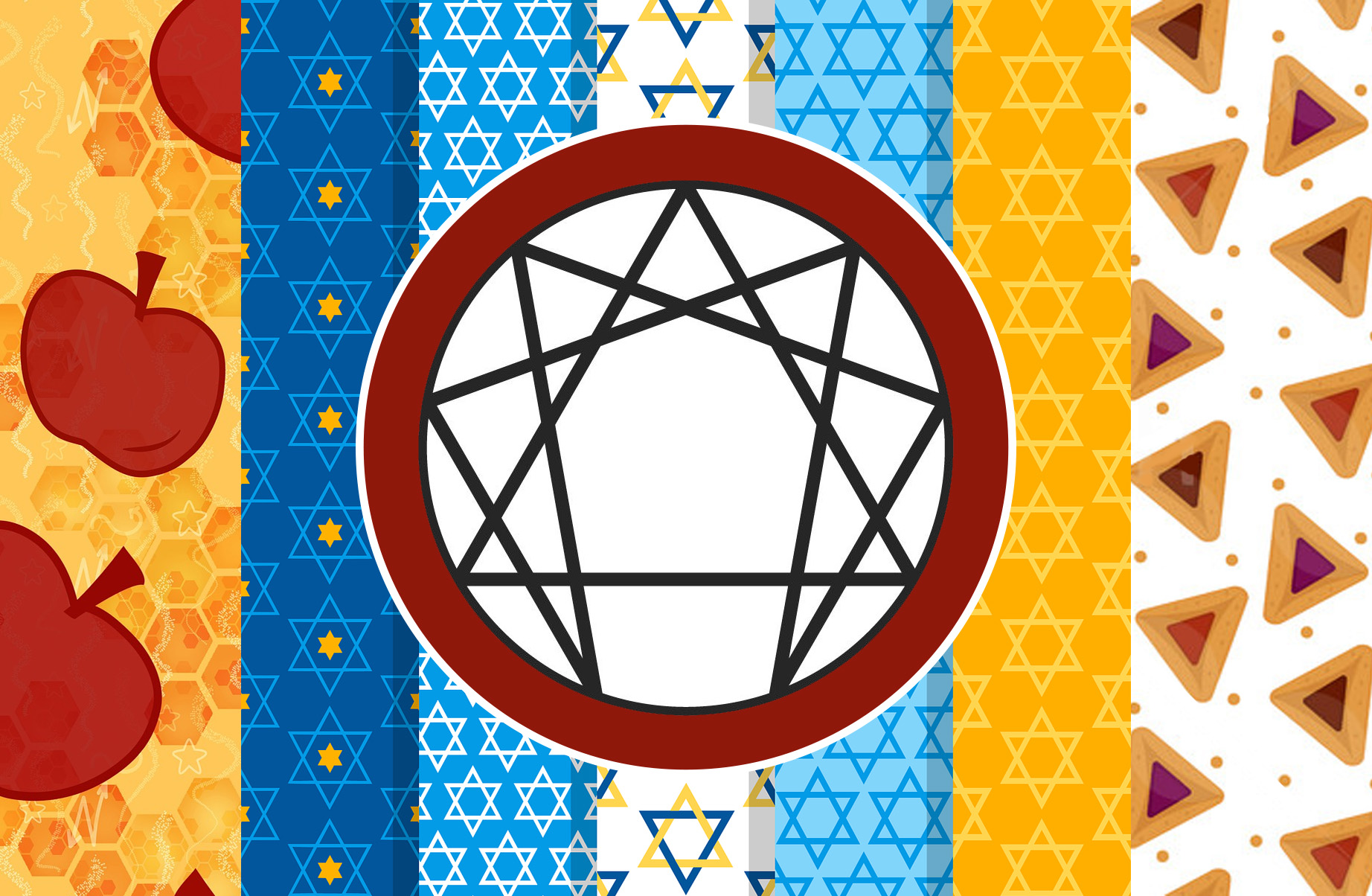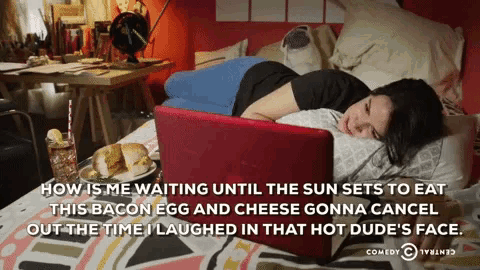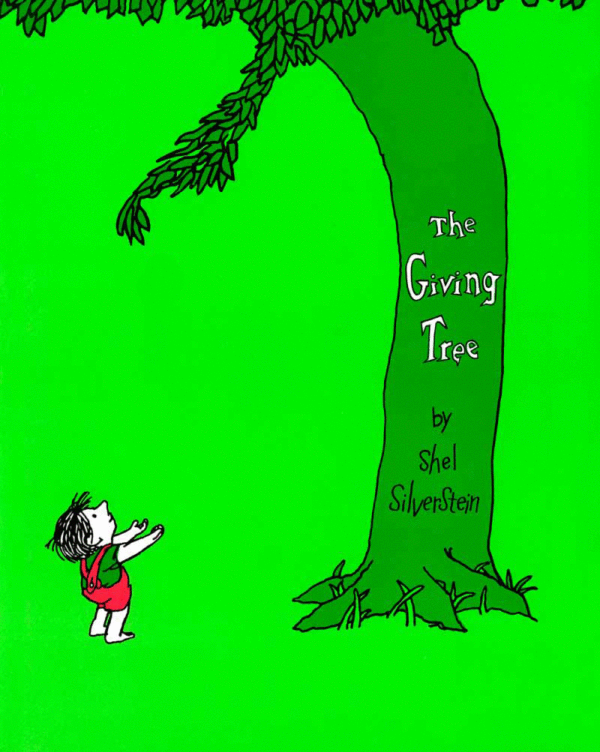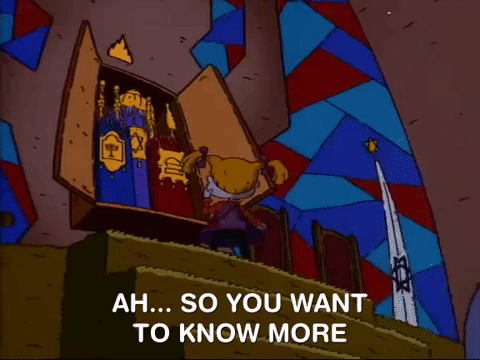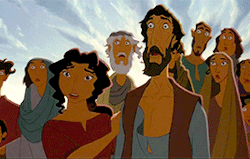I first learned about the enneagram at a Jewish activist retreat. Someone brought up horoscopes, and the room filled with enthusiastic amateur psychologists proclaiming their astrology sign or Meyers-Briggs type over lunch. When I couldn’t provide my enneagram type, a friend directed me to an online quiz and started drawing a diagram on the back of a song sheet.
The nine enneagram types are arranged in a circle like a clock face, with intersecting interior lines showing directions of growth and stress for each type. Each enneagram type has a core desire and core fear, which motivate the behaviors attributed to it.
The origins of the enneagram are disputed and unclear. Precursors or inspirations of the system might be found in Plato’s Theory of Forms, Pythagorean mathematics, Jewish mystical ideas of Sephirot, the Christian theologian Ponticus’ Seven Deadly Sins, and Sufi mystical symbols. The enneagram as we know it today was created in the 1950’s by Bolivian psycho-spiritual teacher, Oscar Ichazo. It found popularity first in Christian marriage counseling, and then through some strange crossover among my leftist Jewish friends.
I’ve spent a mildly embarrassing amount of time debating the finer points of the enneagram with fellow Jews, which led to the following enneagram/Jewish holiday typology. After an encouraging response when I posted my theory on an Instagram story, here you have it.
If you know your enneagram type, keep reading to find out which Jewish holiday you embody! If you’re an enneagram novice, learn about each type through a Jewish lens here, then take the quiz! As always in our Jewish tradition, disagreements are eagerly anticipated.
Type 1: Yom Kippur
Type one is the Reformer. The core desire of this type is to be good, and the core fear is being broken or corrupted. Type ones are perfectionists with strong moral codes, constantly striving for self-improvement. They see the distance between the world as it is and the world as it could be. Type ones can be highly critical of others or themselves, but they can also be strong advocates for higher ideals and causes.
Type ones don’t have to be told twice to reflect on their past mistakes, and their strong self-discipline will get them through an entire day of fasting. Yom Kippur may not be the most fun holiday, but it’s perfect for a type yearning for perfection. Hopefully the opportunity to forgive others will remind type ones to be gentle with themselves.
Type 2: Tu Bishvat
Type two is the Helper. The core desire of type two is to feel loved, and the core fear is being unwanted. The greatest joys in life for a type two are found in relationships and expressions of care. They are generous to the point of being self-sacrificing. Type twos may become resentful if they feel unappreciated, because they believe their worth is derived from what they do for others. Healthy twos are able to maintain a balance, acknowledging their own needs and acting altruistically without depleting themselves.
Planting a tree is an act of altruism that any type two can get behind! On Tu Bishvat, a Jewish celebration of trees, you can find them organizing community gardening projects or bringing baskets of fruit to friends. Tu Bishvat serves as a reminder that the trees (or global ecosystems) that sustain human life require nourishment and care in return.
Type 3: Rosh Hashanah
Type three is the Achiever. The type three core desire is to be worthy or valuable, and the core fear is being worthless. Type threes define success according to the values of their community. They are motivated to meet the expectations of the people they respect, and work hard to achieve their own high standards. Threes may struggle to distinguish between their own desires and what will be valued by the people around them. At their best, threes are authentic, competent role models.
Type threes will proudly call the community together on Rosh Hashanah with a loud, clear shofar blast. They’re ready to close the book on a year of achievement, with high hopes for the months ahead. Taking some time for reflection will help type threes check in with themselves and stay grounded in what’s truly important.
Type 4: Rosh Chodesh
Type four is the Individualist. The core desire of type four is to be unique or to discover their own identity, and the core fear is having no personal identity or significance. Type fours are constantly trying to understand their true nature through reflection or exploration, which means they are typically very self-aware. They have a suspicion (or hope, or fear) that they are different from other people in some fundamental way. Type fours can be prone to depression or self indulgence, but they are also insightful and creative, even visionary. Many artists identify with the type four.
Type fours would hate being represented by a “basic” Jewish holiday. Rosh Chodesh, a mystical Jewish observation of the new lunar month, offers an opportunity for type fours to get reflective and practice a bit of Jewish magic. Jewish women, who were traditionally excluded from many communal practices, developed some Rosh Chodesh traditions for themselves. These days, you can find type four observers of Rosh Chodesh lighting candles, meditating on gender theory, or exchanging blessings with friends.
Type 5: Shavuot
Type five is the Investigator. The core desire of type five is to be capable or competent, and the core fear being useless or helpless. Type fives are driven to understand the world around them as a way to be self-reliant. Personal boundaries are important to fives. While they crave human connection, they may struggle with intimacy or emotional intensity. Type fives love learning, and are fascinated by niche interests and new sources of knowledge. While type fives keep their own personal lives private, they are keen observers of other people, often developing excellent intuitions.
A five’s thirst for learning will be satisfied on Shavuot, a Jewish holiday dedicated to the celebration and study of Torah. Type fives will be happy to stay up all night engaging in deep ethical or spiritual conversations with their community, or curl up solo with a slice of cheesecake and a text study.
Type 6: Passover
Type six is the Loyalist. The core desire of this type is security, and the core fear is being without security or guidance. Sixes are anxious, dwelling on anything that could go wrong. They want to feel like they have something they can count on or “hold on to,” whether it’s relationships, a community, or an ideology. A six’s desire to believe in something, coupled with a natural defensive suspicion, creates a complicated relationship to authority. They are intensely loyal friends to the people they trust. Sixes will defend their beliefs or their community more fiercely than they defend themselves.
The heroes of the Passover story demonstrate some six-like loyalty: mothers and midwives defying Pharaoh to protect their children, G-d remembering a commitment to the enslaved Israelites, Moses steadfastly demanding freedom for his people. And, like the anxious imagination of a six, escalating plagues cause chaos in the land of Egypt. Type sixes will keep the Passover story alive with dramatic retellings and preserve family traditions, from special recipes to the plastic frogs around the seder plate.
Type 7: Purim
Type seven is the Enthusiast! The core desire of type sevens is to be happy, and the core fear is experiencing suffering or pain. They are always looking for new, exciting experiences. Sevens are playful and spontaneous, and they highly value their freedom. Sevens may get bored with routine, feel trapped by commitment, or avoid dealing with pain by moving from adventure to adventure. They are not afraid of a challenge! Friends of a seven get to come along for the (sometimes wild) ride.
Type sevens are made for Purim. Commemorating the anniversary of the Jews almost being murdered with a rowdy carnival makes perfect sense to a seven. They’re ready to pull out a wild costume, eat some delicious Hamentashen, and get the dancing started.
Type 8: Hanukkah
Type eight is the challenger. Eights’ core desire is to protect themselves and control their own destiny, and their core fear is being dominated by others or external circumstances. Eights are strong willed, decisive, and self confident. They are good at identifying power dynamics in any group, and like having the upper hand. They may struggle to be emotionally vulnerable or become confrontational, but protective eights also believe in sticking up for the little guy.
Type eights will identify with stories of the Maccabees taking on the mighty Roman empire. You can find eights taking charge of latke preparation or winning big in a game of dreidel. It’s only fitting that type eights embody the Jewish holiday most dominant in American culture. Hannukah is the holiday of determination in the face of adversity, bright lights, and powerful eight energy.
Type 9: Shabbat
Type nine is the Peacemaker. The core desire of nines is to have stability and harmony, and the core fear is disruption or conflict. Type nines are easygoing and agreeable. In an attempt to avoid conflict, they may repress their own anger, tune out anything upsetting, or stubbornly try to preserve things as they are. Natural empaths, they are good at picking up on the emotions of others and learning to respond in ways that create harmony.
Nines know how to welcome the rest of Shabbat. A nine will love spending a peaceful day with loved ones, sharing a meal, or a nice afternoon nap. Like a true nine, Shabbat offers a moment to step away from conflict and be content.
